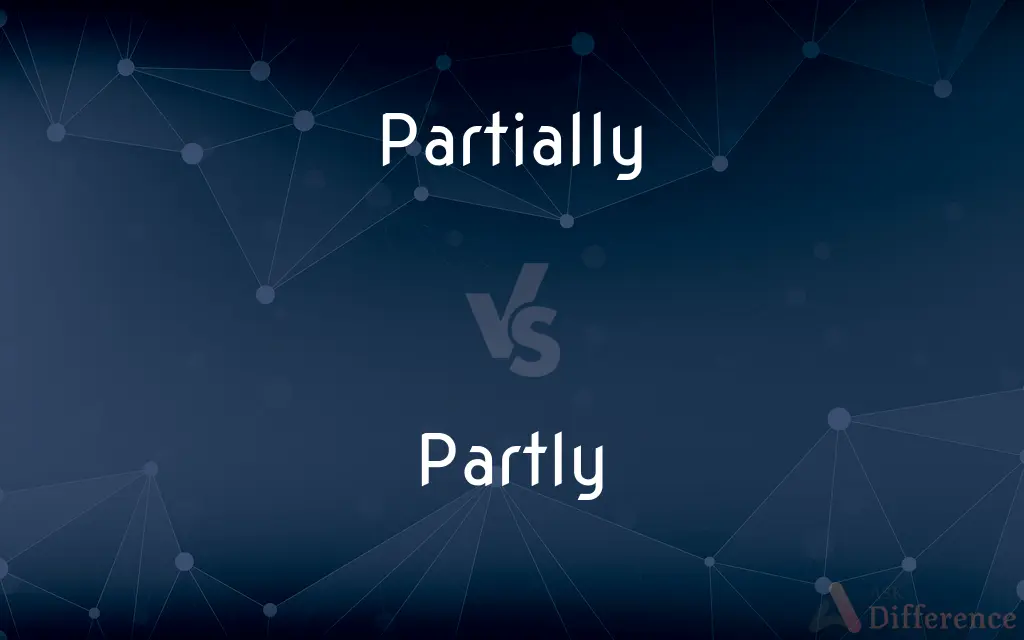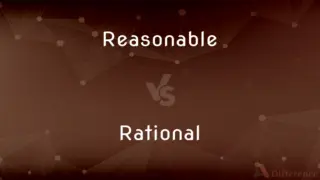Partially vs. Partly — What's the Difference?
By Fiza Rafique & Urooj Arif — Updated on April 2, 2024
Partially implies something is incomplete or done to some extent, focusing on the extent of completion, while partly suggests something is done in part, emphasizing the component or aspect involved.

Difference Between Partially and Partly
Table of Contents
ADVERTISEMENT
Key Differences
Partially is often used to describe the degree to which an action, process, or state is incomplete. It implies that something has been done, but not wholly, focusing on the extent or degree of completion. For example, a task can be partially completed, indicating that progress has been made, but it is not yet finished. On the other hand, partly refers to one of several parts or aspects of something, emphasizing the specific section or component involved rather than the degree of completion. When something is described as partly responsible, it indicates that it is one of a few contributing factors, not necessarily reflecting on how much or to what extent.
The use of partially is common in contexts where the emphasis is on the incomplete nature of an action or state, suggesting that more remains to be done. It conveys a sense of something being not entirely realized or fulfilled. Whereas partly is used when the focus is on distinguishing among different components or aspects that make up a whole, suggesting that only one part or some parts are involved or affected, without necessarily commenting on the extent of involvement.
Partially can also imply a qualitative assessment, suggesting that something does not fully meet a certain standard or condition. This usage is prevalent in evaluations or critiques, where something might be partially effective, indicating it does not fully achieve its intended effect. Partly, however, leans towards a quantitative distinction, separating a whole into distinguishable segments, where the emphasis is on the identity of the segments rather than the quality of completion or effectiveness.
In legal or formal documents, partially is often preferred to denote the extent of applicability, validity, or responsibility, emphasizing the degree to which something is applicable or true. Conversely, partly might be used to specify the particular aspects or sections of a document or law that are relevant, focusing on dividing the subject into relevant portions.
When discussing involvement or contribution, partially tends to imply a limited degree of involvement or contribution to a whole, suggesting that while there is some involvement, it is not complete or total. Partly, in contrast, is used to highlight the fact that only certain parts, aspects, or individuals are involved, without making a judgment about the degree of that involvement or contribution.
ADVERTISEMENT
Comparison Chart
Focus
Extent of completion
Component involved
Common Usage
Incomplete actions or states
Specific sections or components
Implication
Not entirely realized or fulfilled
Only one part or some parts involved
Context
Qualitative assessments
Quantitative distinctions
Preference in Documents
Degree of applicability or validity
Specifying relevant aspects or sections
Compare with Definitions
Partially
Reflecting an incomplete state or process.
The law was partially implemented.
Partly
In part; not wholly.
The delay was partly due to the weather.
Partially
In an incomplete manner.
The form was only partially filled out.
Partly
Distinguishing among different parts.
The country's economic problems are partly structural.
Partially
To some extent but not completely.
The project is partially done, but we still have a lot to cover.
Partly
To some degree or in some respects.
The decision was partly influenced by cost considerations.
Partially
Indicating a degree of involvement or contribution.
She was partially responsible for the success of the event.
Partly
Involving only a portion or aspect.
The room was partly lit by natural light.
Partially
Not wholly or fully.
The view was partially obscured by fog.
Partly
Referring to a component or fraction.
The success was partly his effort.
Partially
To a degree; not totally.
Partly
In part or in some degree; not completely.
Partially
To a partial degree or extent, incompletely.
Partly
In part, or to some degree, but not completely.
They partly finished the house so they could move in before winter;
The car was partly visible in the garage
Partially
In part; not totally; as, partially true; the sun partially eclipsed.
Partly
In part; in some measure of degree; not wholly.
Partially
In a partial manner; with undue bias of mind; with unjust favor or dislike; as, to judge partially.
Partly
In part; in some degree; not wholly;
I felt partly to blame
He was partially paralyzed
Partially
In part; in some degree; not wholly;
I felt partly to blame
He was partially paralyzed
Common Curiosities
Does partially always imply an incomplete action?
Yes, partially usually implies that an action, process, or state is incomplete to some degree.
What does partly mean?
Partly means involving only a portion or aspect of something, emphasizing the specific parts involved.
Can partially and partly be used interchangeably?
While they can sometimes be used interchangeably, their nuances mean partially emphasizes the degree of completion, whereas partly focuses on the component involved.
Is partially a qualitative assessment?
Partially can imply a qualitative assessment, especially when it suggests something does not fully meet a certain standard.
What is an example of a situation where only partially applies?
A law partially implemented suggests that only some of its provisions are in effect, emphasizing the incomplete application.
How do I decide whether to use partially or partly?
Choose partially when highlighting the extent to which something is done or true, and partly when pointing out specific parts or aspects involved.
What does partially mean?
Partially means to some extent but not completely, focusing on the extent of completion or fulfillment.
Is partly more about quantity or quality?
Partly is more about quantity, as it refers to the specific parts or portions of a whole.
Is partially more formal than partly?
Both are formal, but partially is often preferred in more technical or legal contexts to denote degrees of applicability or validity.
Can something be partly and partially true at the same time?
Yes, something can be both partly and partially true, meaning it is true to some extent (partially) and in certain aspects (partly).
What is an example of a situation where only partly applies?
If a task is partly completed by one team and partly by another, it indicates the division of work, focusing on the contributing parts.
How does context affect the choice between partially and partly?
The choice is influenced by whether the focus is on the extent of something being done (partially) or on distinguishing among its parts (partly).
How does partly convey specificity in a description?
Partly specifies by highlighting particular aspects or sections involved in a broader context, aiding in clarity and focus.
Can the choice between partially and partly affect the perceived meaning in a sentence?
Yes, choosing between them can subtly shift the focus from how much something is done to which parts are involved, affecting interpretation.
Can the use of partially or partly indicate bias in reporting?
Potentially, as their use can emphasize different aspects of a story or event, influencing perception by focusing on completeness or specific components.
Share Your Discovery

Previous Comparison
Reasonable vs. Rational
Next Comparison
Connect vs. LinkAuthor Spotlight
Written by
Fiza RafiqueFiza Rafique is a skilled content writer at AskDifference.com, where she meticulously refines and enhances written pieces. Drawing from her vast editorial expertise, Fiza ensures clarity, accuracy, and precision in every article. Passionate about language, she continually seeks to elevate the quality of content for readers worldwide.
Co-written by
Urooj ArifUrooj is a skilled content writer at Ask Difference, known for her exceptional ability to simplify complex topics into engaging and informative content. With a passion for research and a flair for clear, concise writing, she consistently delivers articles that resonate with our diverse audience.














































